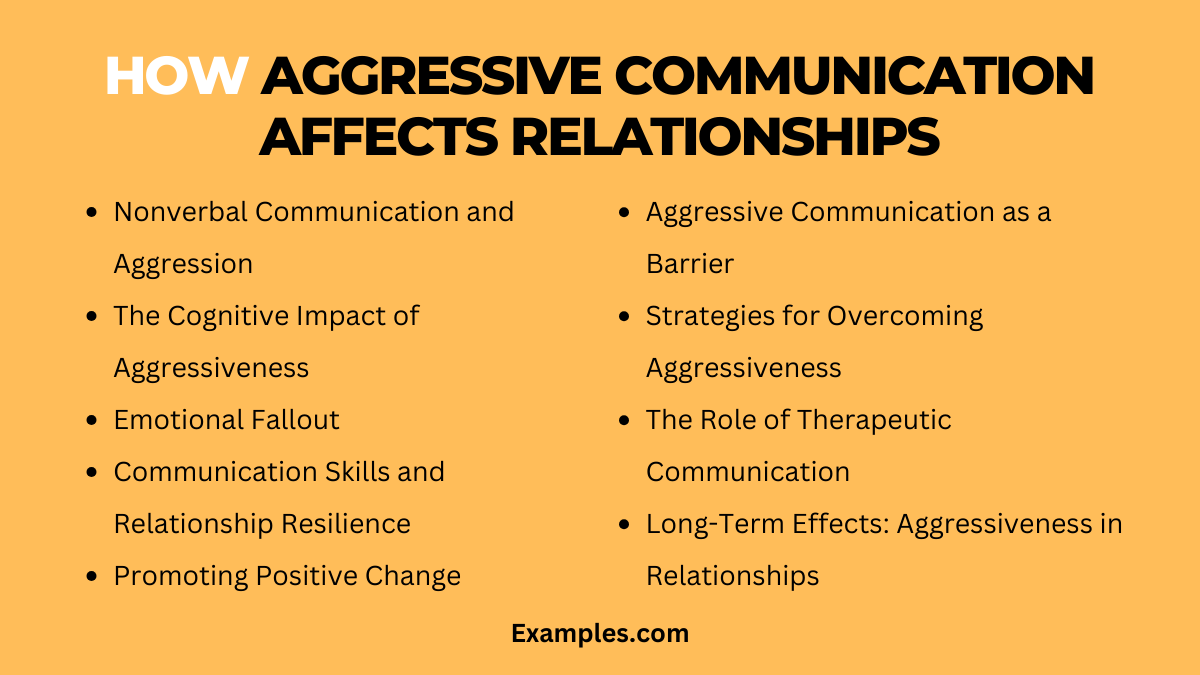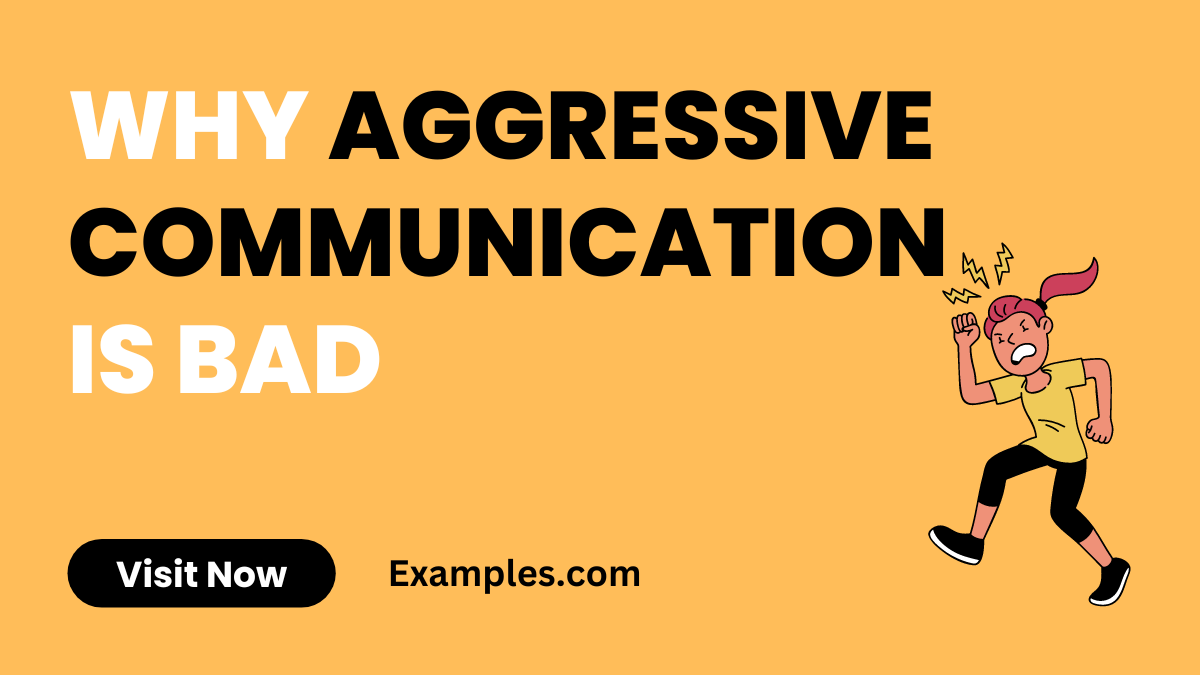Why Aggressive Communication is Bad?
Navigating a relationship with an aggressive spouse requires finesse and understanding. In this comprehensive guide, we delve into practical strategies to cope with an aggressive husband or wife. Communication examples play a pivotal role in illustrating effective approaches. Explore insights, tips, and real-life scenarios to foster a healthier connection. Whether it’s assertive communication or conflict resolution, this guide empowers you to transform challenging moments into opportunities for growth and understanding. Learn to navigate the complexities with empathy and effective communication examples.
How Aggressive Communication Affects Relationships
Aggressive communication can have profound impacts on relationships, influencing dynamics and emotional well-being. Understanding these effects is crucial for fostering healthy connections.

- Nonverbal Communication and Aggression
Nonverbal cues often amplify aggressive messages, exacerbating tension. Raised voices, intense gestures, and hostile body language can create an atmosphere of fear and unease, straining relationships. - The Cognitive Impact of Aggressiveness
Explore the intricate ways aggressiveness affects the brain. From heightened stress levels to impaired cognitive functions, delve into the psychological toll aggressive communication takes on both parties involved. - Emotional Fallout: Effects of Aggressive Behaviour
Unravel the emotional aftermath of aggressive behaviour. Discover how anger, resentment, and emotional scars can linger, impacting long-term relationship dynamics. Explore effective coping mechanisms for emotional healing. - Communication Skills and Relationship Resilience
Assess the role of communication skills in mitigating aggression’s impact. Effective communication strategies, such as active listening and assertiveness, play a pivotal role in building resilience and nurturing healthier relationships. - Aggressive Communication as a Barrier
Examine how aggressive communication becomes a formidable barrier to positive interactions. Identify key communication obstacles and learn strategies to dismantle these barriers, promoting openness and understanding. - Strategies for Overcoming Aggressiveness
Equip yourself with practical strategies to address and overcome aggressive communication. From assertive communication techniques to conflict resolution skills, discover proactive steps to transform negativity into constructive dialogue. - The Role of Therapeutic Communication
Explore the therapeutic potential of communication in healing relational wounds caused by aggression. Learn how thoughtful, empathetic communication can rebuild trust and strengthen emotional bonds. - Long-Term Effects: Aggressiveness in Relationships
Investigate the lasting implications of persistent aggressiveness in relationships. From erosion of trust to emotional detachment, understand the potential long-term consequences and explore preventative measures. - Promoting Positive Change
Harness the power of communication examples to drive positive change. Real-life scenarios illustrate effective communication techniques, offering practical insights and inspiration for transforming aggressive communication patterns.
What are The Aggressive Communication Strategy & Harmful Aspects
Communication is a powerful tool that can shape relationships and interactions, but when employed aggressively, it can have detrimental effects. This guide explores the strategy behind aggressive communication and its harmful aspects, shedding light on the dynamics at play.
Understanding Aggressive Communication
Aggressive communication is more than just loud words; it’s a strategy. It involves the intentional use of intimidating language, tone, or body language to dominate a conversation. This strategy often stems from a desire to control, manipulate, or express frustration.
Harmful Aspects of Aggressive Communication
- Erosion of Trust: Aggressive communication erodes trust within relationships, creating an atmosphere of fear and apprehension. People may become hesitant to share their thoughts, hindering open dialogue.
- Deterioration of Relationships: The aggressive communicator may experience strained relationships as others withdraw to avoid confrontation. Long-term damage to personal and professional connections is a common consequence.
- Impact on Mental Health: Victims of aggressive communication may suffer from stress, anxiety, or even depression. The constant exposure to hostility takes a toll on mental well-being.
- Barriers to Resolution: Aggressive communication rarely facilitates conflict resolution. Instead, it deepens divides and makes it challenging to find common ground.
Strategies to Curb Aggressive Communication
- Cultivate Self-Awareness: Recognizing one’s own aggressive communication tendencies is the first step toward change. Self-awareness lays the foundation for adopting healthier communication strategies.
- Practice Active Listening: Encourage dialogue by actively listening to others. This not only fosters understanding but also promotes a more empathetic and less combative communication style.
- Choose Words Wisely: Replace aggressive language with assertive and respectful expressions. Thoughtful word choices can defuse tension and contribute to a more positive atmosphere.
- Seek Professional Help: For entrenched patterns of aggressive communication, seeking guidance from a therapist or counsellor can provide valuable insights and strategies for change.
What are the Effects of Aggressive Behaviour?
Aggressive behaviour can have far-reaching consequences, impacting individuals, relationships, and even broader social dynamics. This guide delves into the multifaceted effects of aggressive behaviour, exploring its psychological, social, and emotional implications.
Psychological Effects of Aggressive Behaviour
- Increased Stress Levels: Both the aggressor and the recipient of aggression often experience heightened stress levels. Persistent stress can lead to various physical and mental health issues.
- Negative Impact on Self-Esteem: Aggressive behaviour can diminish the self-esteem of those subjected to it. Constant criticism and hostility contribute to feelings of inadequacy and worthlessness.
- Development of Defensive Mechanisms: Individuals facing aggression may develop defensive mechanisms, such as avoidance or withdrawal, to protect themselves emotionally.
Social Effects of Aggressive Behaviour
- Strained Relationships: Aggressive behaviour strains relationships, leading to a breakdown in trust and communication. Close connections may be severed, impacting social support networks.
- Impact on Work Environment: In professional settings, aggressive behaviour can create a hostile work environment, affecting productivity, job satisfaction, and overall team dynamics.
- Social Isolation: Individuals displaying aggressive behaviour may find themselves socially isolated as others avoid interactions to sidestep confrontation.
Emotional Effects of Aggressive Behaviour
- Increased Hostility: Aggressive behaviour perpetuates a cycle of hostility. Individuals may find it challenging to break free from this pattern, contributing to a negative emotional state.
- Impaired Emotional Regulation: Aggressors often struggle with regulating their emotions, leading to outbursts that further strain relationships and hinder personal growth.
Breaking the Cycle of Aggressive Behavior
- Developing Emotional Intelligence: Building emotional intelligence allows individuals to understand and manage their emotions effectively, reducing the likelihood of aggressive behaviour.
- Learning Conflict Resolution Skills: Acquiring skills in conflict resolution empowers individuals to address issues constructively, fostering healthier relationships.
- Cultivating Empathy: Cultivating empathy enhances understanding and compassion, making it easier to navigate conflicts without resorting to aggression.
In conclusion, this comprehensive guide highlights the perils of aggressive communication and offers actionable insights for positive change. By exploring real-life examples and practical strategies, readers gain a deep understanding of why aggressive communication is detrimental. Armed with effective tools and alternatives, individuals can navigate conflicts, foster healthier connections, and contribute to a more harmonious and understanding world.



